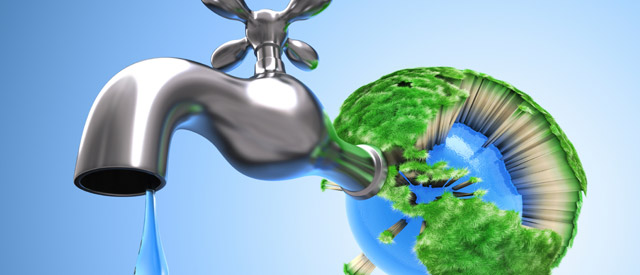 Increasing Scarcity of Clean Water is a Global Challenge
Increasing Scarcity of Clean Water is a Global Challenge
Environmental engineering company Talbot & Talbot reports that the increasing scarcity of clean water has emerged as one of the most pressing challenges of the twenty-first century.
Burgeoning populations and an increase in per capita water consumption due to improving lifestyles has placed water resources under increasing strain. The ‘United Nations World Water Development Report’ predicts that by the year 2050, at worst, seven-billion people will be faced with water scarcity and, at best, two-billion people will be exposed to water scarcity.
To exacerbate the problem, pollution reduces the amount of clean water available by rendering water resources unfit for use. A further issue that is expected to contribute to the scarcity of water in the future is climate change. The precise impact that climate change will have is uncertain, but it has been estimated that with the changes in rainfall patterns, climate change may account for a 20 % increase in global water scarcity
The company states that an increasingly attractive means for counteracting the scarcity of fresh water is wastewater reclamation. “Advances in water treatment technology have allowed wastewater to be reclaimed at a consistent quality and reasonable cost. The reclamation of wastewater is a growing practice in many parts of the world. Even countries that are not generally considered to have water scarcity problems have begun to reclaim water in significant quantities. The US reportedly reuses 7,4 % of its total effluent production,” reports Talbot & Talbot.
The reclamation of water is beneficial in a number of ways. It decreases the discharge of pollutants to the environment while lessening the demand on sensitive water bodies. It also extends existing water supplies by providing a high-quality water supply to serve a variety of beneficial uses.
There are many options for wastewater reuse.
Globally, agriculture is a major consumer of water resources. The company says that the use of treated municipal effluent for irrigation in agriculture is growing in popularity. The cost of doing so depends largely on the level of treatment required.
Concerns over the use of recycled wastewater in agriculture focus largely on the presence of pathogenic organisms, heavy metals, trace organics and high levels of dissolved salts.
Many researchers call for the tertiary treatment of municipal waste using membranes or ozonation before its use in irrigation. The company points out that the costs of increased environmental monitoring associated with reclaimed water irrigation can be discouraging.
This example, it reports, typifies the issues currently standing in the way of many water reclamation projects. “Private entities considering water reclamation focus almost exclusively on the internal costs and benefits associated with water reclamation. Unfortunately, reclaimed water is generally more expensive to produce compared with water drawn from fresh water resources. The external benefits of water reclamation, such as the extension of the capacity of existing water resources, generally do not feature in the decision-making process when water reclamation is being considered. It is only in the face of dwindling fresh water supplies or deteriorating fresh water quality that industries begin seriously considering wastewater reclamation.”
The company says that a wastewater reclamation project that it recently commissioned for one of its major clients in Dar Es Salaam is a an example of industry taking the technological initiative and overcoming water scarcity.
Under increasing demand, the aquifer from which Talbot & Talbot’s client draws its water is gradually deteriorating as a result of sea water ingress. Talbot & Talbot partnered with its client to alleviate this challenge by upgrading its existing effluent treatment train (anaerobic digestion followed by activated sludge) to include a membrane biological reactor, reverse osmosis and granular activated carbon filtration.
The upgraded plant provides the client with capacity to recycle up to 65% of the effluent it produces. The company reports that the recycled water is of such high quality as to enable its use for a diverse range of applications in the factory. Talbot & Talbot’s staff are under contract to maintain and operate the water treatment and reclamation plant.
The company states that it is evident that there is a growing need for initiatives that strive to conserve water resources or extend their use. “Although most industries are not experiencing significant financial pressure to conserve and reclaim water, the time when this will be the case is drawing near. The technology and expertise to cost-effectively recycle wastewater is now available and the investment in infrastructure to reclaim wastewater is a huge stride towards sustainability.”
| Contact information |
Andrea Firth
|
|---|---|
| News type | Inbrief |
| File link |
http://www.waterresource.co.za/index.php?option=com_content&view=article&id=13:increasing-scarcity-of-clean-water-is-a-global-challenge-&catid=6:current&Itemid=13 |
| Source of information | Engineering News online |
| Subject(s) | DRINKING WATER , DRINKING WATER AND SANITATION : COMMON PROCESSES OF PURIFICATION AND TREATMENT , RISKS AND CLIMATOLOGY , SANITATION -STRICT PURIFICATION PROCESSES , WATER DEMAND , WATER QUALITY |
| Geographical coverage | International |
| News date | 19/08/2009 |
| Working language(s) | ENGLISH |
 you are not logged in
you are not logged in





